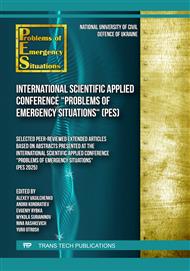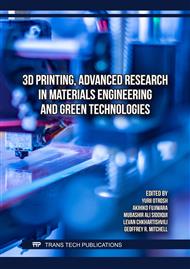[1]
S. Rajbir, Synthetic Dyes, Mittal Publications, New Delhi, India. 2002.
Google Scholar
[2]
M.A. Hassaan, A. El Nemr, Health and Environmental Impacts of Dyes: Mini Review, American Journal of Environmental Science and Engineering. 1 (2017) 64–67.
Google Scholar
[3]
K. Vikrant, B.S. Giri, N. Raza, K. Roy, K.H. Kim, B.N. Rai, R.S. Singh, Recent advancements in bioremediation of dye: Current status and challenges, Bioresour. Technol. 253 (2018) 355–367.
DOI: 10.1016/j.biortech.2018.01.029
Google Scholar
[4]
S. Benkhaya, S. M'rabet, H. Lgaz, A. El Bachiri, A. El Harfi, Dyes: Classification, Pollution, and Environmental Effects, in: S.S. Muthu, A. Khadir (Eds), Dye Biodegradation, Mechanisms and Techniques. Sustainable Textiles: Production, Processing, Manufacturing & Chemistry, Springer, Singapore, 2020, pp.1-50.
DOI: 10.1007/978-981-16-5932-4_1
Google Scholar
[5]
Q.H. Yang, C.Q. Zhao, Removal of Chemical Oxygen Demand in Tannery Effluent by Flocculant, Adv. Mater. Res. 602–604 (2012) 1265–1268.
DOI: 10.4028/www.scientific.net/amr.602-604.1265
Google Scholar
[6]
Y. Sun, D. Li, X. Lu, J. Sheng, X. Zheng, X. Xiao, Flocculation of combined contaminants of dye and heavy metal by nano-chitosan flocculants, J. Environ. Manag. 299 (2021) 113589.
DOI: 10.1016/j.jenvman.2021.113589
Google Scholar
[7]
D. Cao, Y. Wang, X. Zhao, Combination of photocatalytic and electrochemical degradation of organic pollutants from water, Curr. Opin. Green Sustain. Chem. 6 (2017) 78–84.
Google Scholar
[8]
D.K. Sarfo, A. Kaur, D.L. Marshall, A.P. O'Mullane, Electrochemical degradation and mineralisation of organic dyes in aqueous nitrate solutions, Chemosphere. 316 (2023) 137821.
DOI: 10.1016/j.chemosphere.2023.137821
Google Scholar
[9]
V. Dyachok, L. Venher, Application of liquid extraction for wastewater treatment, Journal Environmental Problems, 9 (2024) 213–217.
DOI: 10.23939/ep2024.04.213
Google Scholar
[10]
I. Bordun, T. Vasylinych, M. Malovanyy, H. Sakalova, L. Liubchak, L. Luczyt, Study of adsorption of differently charged dyes by carbon adsorbents, Desalin. Water Treat. 288 (2023) 151–158.
DOI: 10.5004/dwt.2023.29332
Google Scholar
[11]
M.A. Hassaan, A. El Nemr, Advanced Oxidation Processes for Textile Wastewater Treatment, International Journal of Photochemistry and Photobiology. 2 (2017) 85–93.
Google Scholar
[12]
P.O. Oladoye, T.O. Ajiboye, W.C. Wanyonyi, E.O. Omotola, M.E. Oladipo, Ozonation, electrochemical, and biological methods for the remediation of malachite green dye wastewaters: A mini review, Sustainable Chemistry for the Environment. 3 (2023) 100033.
DOI: 10.1016/j.scenv.2023.100033
Google Scholar
[13]
O. Popovych, M. Havryshko, G. Yaremko, Y. Makovskiy, Study of the anaerobic process of industrial water purification in combination with sorption methods, Journal Environmental Problems. 8 (2023) 117–125.
DOI: 10.23939/ep2023.02.117
Google Scholar
[14]
M.M. Sabzehmeidani, S. Mahnaee, M. Ghaedi, H. Heidari, V.A.L. Roy, Carbon based materials: a review of adsorbents for inorganic and organic compounds. Mater. Adv. 2 (2021) 598–627.
DOI: 10.1039/d0ma00087f
Google Scholar
[15]
S. Mishra, L. Cheng, A. Maiti, The utilization of agro-biomass/byproducts for effective bio-removal of dyes from dyeing wastewater: A comprehensive review. J. Environ. Chem. Eng. 9 (2021) 104901.
DOI: 10.1016/j.jece.2020.104901
Google Scholar
[16]
D.C.C.D.S. Medeiros, P. Chelme-Ayala, C. Benally, B.S. Al-Anzi, M. Gamal El-Din, Review on carbon-based adsorbents from organic feedstocks for removal of organic contaminants from oil and gas industry process water: Production, adsorption performance and research gaps. J. Environ. Manag. 320 (2022) 115739.
DOI: 10.1016/j.jenvman.2022.115739
Google Scholar
[17]
R.I. Kosheleva, A.C. Mitropoulos, G.Z. Kyzas, Synthesis of activated carbon from food waste, Environ. Chem. Lett. 17 (2019) 429–438.
DOI: 10.1007/s10311-018-0817-5
Google Scholar
[18]
N.R.B. Razzak, H.I. Syeda, N.A. Milne, E.M. Moon, Turning municipal food organic waste into activated carbon: A step towards circular economy, Therm. Sci. Eng. Prog. 56 (2024) 103073.
DOI: 10.1016/j.tsep.2024.103073
Google Scholar
[19]
E. Rajendaran, M.A.A. Zaini, A. Arsad, N.S. Nasri, Carbon-Based Adsorbents from Used Rubber Slipper for Dye Removal, Mater. Sci. Forum. 951 (2019) 83–88.
DOI: 10.4028/www.scientific.net/msf.951.83
Google Scholar
[20]
Q. Zhao, T. Xu, X. Song, S. Nie, S.-E. Choi, C. Si, Preparation and Application in Water Treatment of Magnetic Biochar, Front. Bioeng. Biotechnol. 9 (2021) 769667.
DOI: 10.3389/fbioe.2021.769667
Google Scholar
[21]
N. Nahurskyi, M. Malovanyy, I. Bordun, E. Szymczykiewicz, Magnetically Sensitive Carbon-Based Nanocomposites for the Removal of Dyes and Heavy Metals from Wastewater: A Review, Chem. Chem. Technol. 18 (2024) 170–187.
DOI: 10.23939/chcht18.02.170
Google Scholar
[22]
P. Staroń, J. Chwastowski, Yeast-Based Magnetic Biocomposite for Efficient Sorption of Organic Pollutants, Appl. Sci. 14 (2024) 655.
DOI: 10.3390/app14020655
Google Scholar
[23]
Y.S. Hao, N. Othman, M.A.A. Zaini, Methylene blue and Congo red removal by activated carbons: A current literature, Acta Univ. Sapientiae, Agric. Environ. 14 (2022) 29-44.
DOI: 10.2478/ausae-2022-0003
Google Scholar
[24]
L. Zhang, L. Yang, J. Chen, W. Yin, Y. Zhang, X. Zhou, F. Gao, J. Zhao, Adsorption of Congo Red and Methylene Blue onto Nanopore-Structured Ashitaba Waste and Walnut Shell-Based Activated Carbons: Statistical Thermodynamic Investigations, Pore Size and Site Energy Distribution Studies, Nanomaterials. 12 (2022) 3831.
DOI: 10.3390/nano12213831
Google Scholar
[25]
G. Mugaishudeen, M. Harish, R. Gopal, Removal of Methylene blue and Congo red from the wastewater in a jet loop reactor using ozone and activated carbon, Desalin. Water Treat. 319 (2024) 100471.
DOI: 10.1016/j.dwt.2024.100471
Google Scholar
[26]
N. Wu, L. Fu, M. Su, M. Aslam, K.C. Wong, V.P. Dravid, Interaction of fatty acid monolayers with cobalt nanoparticles, Nano. Lett. 4 (2004) 383–386.
DOI: 10.1021/nl035139x
Google Scholar
[27]
P. Gorbyk, N. Kusyak, A. Petranovskaya, E. Oranskaya, N. Abramov, N. Opanashchuk, Synthesis and properties of magnetic nanostructures with carbonized surface, Himia, Fizika ta Tehnologia Poverhni. 9 (2018) 176-189. (in Ukrainian)
DOI: 10.15407/hftp09.02.176
Google Scholar
[28]
Z. A. Duryagina, R. L. Holyaka, A. K. Borysyuk, The Automated Wide-Range Magnetometer for the Magnetic Phase Analysis of Alloys: Development and Application, Usp. Fiz. Met., 14 (2013) 33-66. (in Ukrainian)
DOI: 10.15407/ufm.14.01.033
Google Scholar
[29]
B. Bestani, N. Benderdouche, B. Bestaali, M. Belhakem, A. Addou, Methylene blue and iodine adsorption onto an activated desert plant, Bioresour. Technol. 99 (2008) 8441-8444.
DOI: 10.1016/j.biortech.2008.02.053
Google Scholar
[30]
O. Paşka, R. Ianoş, C. Păcurariu, A. Brădeanu, Magnetic nanopowder as effective adsorbent for the removal of Congo Red from aqueous solution, Water Sci. Technol. 69 (2013) 1234–1240.
DOI: 10.2166/wst.2013.827
Google Scholar
[31]
M. Thommes, K. Kaneko, A. Neimark, J. Rodriguez-Reinoso, J. Rouquerol, K. Sing, Physisorption of gases, with special reference to the evaluation of surface area and pore size distribution (IUPAC Technical Report), Pure Appl. Chem. 87 (2015) 1051–1069.
DOI: 10.1515/pac-2014-1117
Google Scholar
[32]
I. Bordun, E. Szymczykiewicz, Synthesis and Electrochemical Properties of Fe₃O₄/C Nanocomposites for Symmetric Supercapacitors, Appl. Sci. 14 (2024) 677.
DOI: 10.3390/app14020677
Google Scholar
[33]
J. De Souza Macedo, N.B. da Costa Júnior, L.E. Almeida, E.F. da Silva Vieira, A.R. Cestari, I. de Fátima Gimenez, N.L. Villarreal Carreno, L.S. Barreto, Kinetic and calorimetric study of the adsorption of dyes on mesoporous activated carbon prepared from coconut coir dust, J. Colloid Interface Sci. 298 (2006) 515–522.
DOI: 10.1016/j.jcis.2006.01.021
Google Scholar
[34]
R.W. Dapson, Amyloid from a histochemical perspective. A review of the structure, properties and types of amyloid, and a proposed staining mechanism for Congo red staining, Biotech. Histochem. 93 (2018) 543–556.
DOI: 10.1080/10520295.2018.1528385
Google Scholar
[35]
C.H. Giles, T.H. MacEwan, S.N. Nakhwa, D. Smith, Studies in adsorption. Part XI. A system of classification of solution adsorption isotherms, and its use in diagnosis of adsorption mechanisms and in measurement of specific surface areas of solids, J. Chem. Soc. (1960) 3973-3993.
DOI: 10.1039/jr9600003973
Google Scholar
[36]
M. Özacar, I.A. Sengil, Adsorption of metal complex dyes from aqueous solutions by pine sawdust, Bioresour. Technol. 96 (2005) 791–795.
DOI: 10.1016/j.biortech.2004.07.011
Google Scholar
[37]
Y. Yao, F. Xu, M. Chen, Z. Xu, Z. Zhu, Adsorption behavior of methylene blue on carbon nanotubes, Bioresour. Technol. 101 (2010) 3040–3046.
DOI: 10.1016/j.biortech.2009.12.042
Google Scholar



